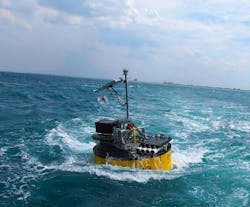US DOE Invests $10M in 7 Marine Energy Technologies Projects
The United States Department of Energy (DOE) announced it is investing nearly $10 million in seven projects developing and testing energy technologies that utilize marine energy resources, such as wave, tidal, and river currents. This will advance the DOE’s research on wave-powered technologies for use in desalination and support a feasibility study for a proposed ocean current testing facility.
“Marine energy technologies have incredible potential to provide clean electricity as well as clean water,” said Alejandro Moreno, Acting Assistant Secretary for Energy Efficiency and Renewable Energy. “These projects represent DOE’s first significant investment in marine energy serving the blue economy market and will advance technologies that can meet these needs and help achieve President Biden’s goal of a net-zero-emissions economy by 2050.”
The seven projects are part of the DOE Water Power Technologies Office’s Power the Blue Economy Initiative, and all focus on four main areas:
1. Providing robust and reliable designs of wave-powered desalination systems.
2. Reducing risk and validating novel components in wave-power desalination systems.
3. Supporting advancements in marine energy desalination more broadly.
4. Evaluating the feasibility of establishing an ocean current testing facility to share testing costs across developers and reduce barriers to testing.
The seven selected projects include:
Oneka IceCube – Emergency Relief Wave-Powered Desalination
Award amount: $1,996,849.
Carried out by Oneka Technologies USA Inc. in Fort Pierce, Florida, Oneka IceCube is a wave-powered desalination technology designed for emergency relief applications.
DUO-DS Wave-Powered Desalination System Sea Trials
Award amount: $1,879,178
Sea Potential LLC’s project in Canaan, Connecticut, will deploy, test, and expedite the commercialization of their wave-powered desalination device which pumps seawater through a reverse osmosis membrane to produce freshwater.
Long-Duration Testing and Scalability of Lightweight, Rapidly Deployable, Wave-Powered Reverse Osmosis System
Award amount: $1,568,114
Water Bros Desalination LLC’s project in Charlotte, North Carolina, will advance its Wave-Actuated, Tethered Emergency Response Buoyant Reserve Osmosis System desalination system.
Oneka IceCube – Subcomponents Breakthrough Innovations for Wave-Powered Desalination
Award amount: $1,395,579
Oneka Technologies’ second project will develop a self-cleaning seawater intake system, optimize system design to preserve the life of reverse osmosis membranes, and lengthen the time between maintenance.
Pumping System and Controller for a Mobile, Anchorless, Wave-Powered Desalination Platform
Award amount: $1,608,160
North Carolina State University’s project in Raleigh, North Carolina, will transform Liquid Robotics’ autonomous Wave Glider into an anchorless desalination platform able to desalinate up to 1,000 gallons of water.
Off-Grid Tidal Turbine-Driven Centrifugal Reverse Osmosis System
Award amount: $607,819
Binghamton University’s project in Binghamton, New York, will develop, test, and establish a proof-of-concept for an integrated tidal desalination system that creates drinkable water from the rotational power generated by hydrokinetic turbines.
U.S. Ocean Current Marine Energy Test Facility Feasibility Assessment
Award amount: $800,000
Florida Atlantic University’s project in Boca Raton, Florida, will assess the feasibility of establishing an ocean current test facility off the coast of Palm Beach County, Florida, to provide testing for current energy converters to accelerate systems to commercial readiness.
About the Author
Breanna Sandridge, Senior Editor
Breanna Sandridge is senior editor for EnergyTech and Microgrid Knowledge, both part of the energy group at Endeavor Business Media.
Prior to that, Breanna was managing editor for Machinery Lubrication and Reliable Plant magazines, both part of Noria Corp. She has two years experience covering the industrial sector.
She also is a 2021 graduate of Northeastern State University (Oklahoma) with a Bachelor's in English.
